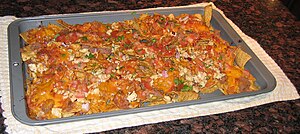This is an old revision of this page, as edited by VoABot II (talk | contribs) at 22:10, 16 January 2008 (BOT - Reverted all consecutive edits by 137.85.253.2 {possible vandalism}.). The present address (URL) is a permanent link to this revision, which may differ significantly from the current revision.
Revision as of 22:10, 16 January 2008 by VoABot II (talk | contribs) (BOT - Reverted all consecutive edits by 137.85.253.2 {possible vandalism}.)(diff) ← Previous revision | Latest revision (diff) | Newer revision → (diff) For the NACHOS operating system, see Not Another Completely Heuristic Operating System. "Nacho" redirects here. For the Spanish nickname, see Ignacio.
Nachos are a popular snack food, originating in North America. In their simplest form, nachos are usually tortilla chips covered in melted cheese. First created circa 1943 by Ignacio "Nacho" Anaya, the original nachos consisted of fried tortilla chips covered with melted cheese and jalapeño peppers. The International Day of the Nacho is celebrated on October 21st with the International Nacho Festival held at Piedras Negras, Coahuila, Mexico.
Origin
Nachos originated in the city of Piedras Negras, Coahuila, Mexico, just over the border from Eagle Pass, Texas, around 1943 at a restaurant called the Victory Club. The account goes that the wives of several U.S. soldiers from nearby Eagle Pass, who were in Piedras Negras on a shopping trip, arrived at the restaurant after it had closed for the day, so chef Ignacio "Nacho" Anaya invented a new dish for them with what little he had available in the kitchen: tortillas and cheese. Anaya cut the tortillas into triangles and fried them, then added yellow Wisconsin cheese, calling the dish nachos especiales, or "Special Nachos".
The word "nachos" first appears in English in 1949.
Variations

A variation consists of a quartered tostada topped with a layer of refried beans and/or various meats and a layer of shredded cheese.
Common additional toppings include:
- Ground beef or chicken
- Chili con carne
- Jalapeño pepper slices
- Other spicy or mild capsicum peppers
- Onions
- Salsa
- Guacamole
- Sour cream
- Lettuce and/or tomatoes
- Olives
A form of processed cheese mixed with peppers and other spices is often used in place of freshly shredded cheese in institutional or large-scale production settings, such as schools, movie theaters, sports venues, and convenience stores, or wherever using freshly grated cheese may be logistically prohibitive. Such processed cheese is referred to in the United States as "nacho cheese." Though originally formulated as a cheaper and more convenient source of cheese to top nachos, this dip has become popular enough in the US that it is readily available in many Mexican-themed restaurants or for purchase at most major grocery stores in both name brand (Frito-Lay, Tostitos, and Taco Bell) and off brand versions, where it is often served accompanied by various shredded cheeses.
Nachos with an abundance of toppings are sometimes called "Loaded Nachos." This type of dish is usually served as an appetizer at bars or restaurants in the United States. The dish is normally prepared in this manner: The tortilla chips are arranged on a platter, meat and refried bean toppings are then added, and the entire platter is smothered with shredded cheese. The platter is then put into a broiler or microwave to allow the cheese to melt. The platter is then covered with the cold toppings (shredded lettuce, tomatoes, salsa, jalapeños, etc.) and served immediately.
In Memphis, Tennessee, barbecue nachos are served in most barbecue restaurants, and also at sporting events. Generous portions of barbecued pork shoulder are placed atop tortilla chips, then covered with melted cheese, barbecue sauce, and sliced jalapeno peppers.
A similar dish that involves tortilla chips and cheese is found in Tex-Mex restaurants. Small bowls of chili con queso and/or, more commonly, salsa, are served with baskets of warm tortilla chips as appetizers.
According to Arlington Stadium (Texas), ballpark nachos were first served there.
See also
References
- ^ Orr, Adriana P. (July 1999). "Nachos, anyone?". OED News. Oxford University Press. Retrieved 2007-11-04.
- The year is attributed to Anaya's son, Ignacio Anayo Jr.
- Arlington Stadium
- Denver Post reference to International Day of the Nacho, October 21.
- Dunne, Mike. (January 28 2004). "One spicy tale: 'Macho Nachos'. Sacramento Bee, p. F1.
External links
- Recipe for vegetarian nachos
- ILoveNachoCheese.com - Recipes, Humor, and Opinions on nachos and nacho cheese